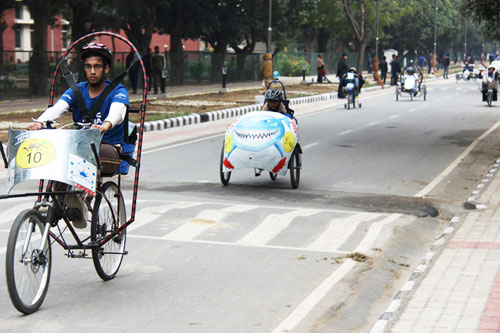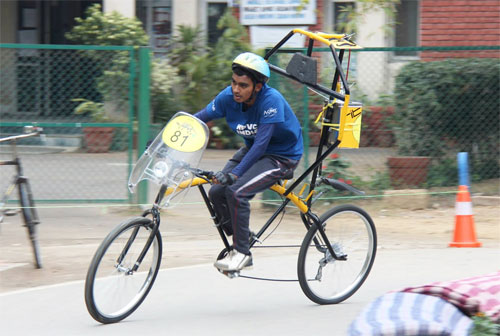Inaugural HPVC India Event is a Resounding Success
Inaugural HPVC India Event is a Resounding Success

The first ASME Human Powered Vehicle Challenge (HPVC) to be held in India was an unqualified success, with more than 400 students and 36 teams from more than 30 universities turning out for the competition.
For more than 30 years, the ASME HPVC program has provided engineering students with the opportunity to demonstrate their skills at applying sound engineering design principles while developing sustainable and practical transportation alternatives.
The HPVC India event, which took place Jan. 17-19, 2014, at the Indian Institute of Technology (IIT) in Delhi, consisted of a design evaluation on Friday, followed by a double-elimination drag race speed competition on Saturday and two-and-a-half hour endurance event on Sunday. HPVC India was co-hosted by Delhi Technological University.
At the end of the three-day competition, Pedocker, the entry from the Indian School of Mines in Dhanbad, emerged as the overall winner. The team placed second in the speed event, third in the endurance event, and fourth in the design category. Rajarambapu Institute of Technology’s entry, ArcK, took second place overall, placing first in the endurance event, third in the speed event, and sixth in design. Jamia Millia Islamia’s Flare, the winner of speed event, finished third overall.

Michael Moorhead, Chair of the Human Powered Vehicle Challenge Committee and Associate Professor of Mechanical Engineering at Rose-Hulman Institute of Technology, characterized the inaugural HPVC India as a “wildy successful” event that far exceeded his expectations.
“When we originally started we thought we’d call it a success if it had 10 or 12 teams that participated, because we never know what an international event is going to look like,” said Dr. Moorhead, who attended the competition with six students from his institute’s human powered vehicle team. “So when we had such great participation, that was the first indicator of success for us. But then getting through the weekend and actually executing the event just as well as we do in the U.S. was just fantastic. It was just much better than I ever would have expected it to be.”

According to Moorhead, the HPVC Committee has been interested in establishing an event in India for the past several years. “Historically there have been a few teams from India that have tried to come to the United States for the U.S.-based HPVC events, and it’s always a real challenge,” he said. “Most of their effort is directed at the logistics of actually getting over here, and most of their money is focused on air fare and lodging. And it hurts them in the long run. We’ve been saying for years that we’d like to have an event in India, but we needed to find a cooperative host. That happened this year with IIT Delhi.”
Moorhead, who is also the faculty advisor for the Rose-Hulman HPVC team, was especially impressed with IIT Delhi’s commitment to the project. “They did a phenomenal job,” he said. “It was one of the best-organized events in the U.S. or elsewhere that we’ve ever seen. They clearly wanted to put on an excellent event.”
The competition in India was the first of four HPVC events that will take place this year. HPVC East will be held April 11-13, 2014, in Orlando, Fla. HPVC West will take place in San Jose, Calif., from April 25-27, 2014. An HPVC Latin America event is also planned for Mexico City in October.
For more information on the HPVC India Event, and complete results from the competition, visit www.hpvcindia.in/results.html. To learn more about the HPVC program, visit www.asme.org/events/competitions/human-powered-vehicle-challenge-(hpvc).



.png?width=854&height=480&ext=.png)